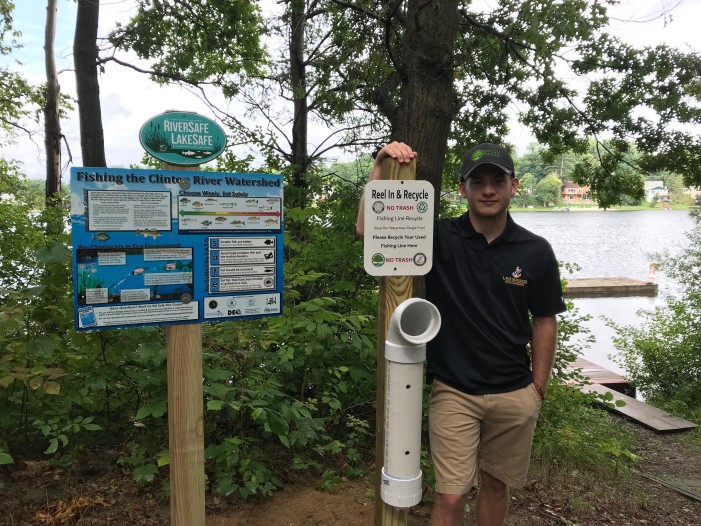By Jim Newell
Review Editor
“Gone Fishing” says the sign up on the door.
But please remember to help protect the environment by recycling your monofilament fishing line.
That’s what Devon DePauw, a 2015 Lake Orion graduate, hopes Orion’s fishing enthusiasts do when snipping their lines or spotting discarded fishing line in the waterways.
DePauw, who is currently pursuing a fisheries degree at Lake Superior State University, built and installed monofilament stations near the beach and by the fishing dock at Camp Agawam and another by the pond at Friendship Park.
As all fishermen know, trying to reel in the big one is sometimes the one that got away, and snapped line or a bit of line on a trimmed lure simply gets discarded when refitting for the next cast.
“It’s just a small-scale project to improve our watershed in the township,” DePauw said. “I installed a few throughout our parks to help.”
DePauw is an avid fisherman and frequents Tommy’s Lake in Camp Agawam. “’I’ve been fishing it a lot since I’ve been a senior in high school,” he said.
“He wanted to bring a part of his education back to the Lake Orion community and give back,” said Orion Twp. Parks and Recreation Director Aaron Whatley. “He saw a need at our parks, where fishing is pretty prevalent, to take measures to protect the waters and fish and add monofilament stations.
Whatley, is also an avid fisherman and sees the necessity of keeping monofilament out of Orion’s waters.
“It’s just a small station that, when you’re done clipping your line or when you find some trash, you take it out of the waterway and put it in one of the stations so that it’s not polluting the water,” Whatley said.
For the past two summers, DePauw has worked for Orion Township’s Parks and Recreation Department and said he’s enjoyed the experience.
“I love working there. I really enjoy working for Aaron (Whatley) and (Parks Manager) Dave (Rafferty). If I come back to Orion I would probably try to work there until I find something else,” DePauw said.
During the busy fishing season, parks and recreation personnel empty the stations almost every day.
“It’s quite amazing how much they’re used,” Whatley said. “We were skeptical at first, but when you go at the end of the day and find a big ball of monofilament it makes you think, ‘Where was this going before?’ Right into the water or the woods.”
Right now, the parks and recreation department collects the fishing line and will mail it to a recycling center, where the line is melted down and recycled, Whatley said.
And while the summer fishing season may be over, ice fishing is on the horizon, so fishermen should remain vigilant in their efforts to recycle their line. While fishing line is great for catching fish, it can cause problems for the environment, including fish and birds, and it can get caught in boat propellers. Fishing line also is durable and will last for decades in the water.
After he graduates college in the fall of 2019, DePauw wants to work for the Department of Natural Resources, possibly in one of the Carolinas, as a field technician in the fisheries division. Any chance to get outside in nature and work.
“I prefer to be outside, collecting data, instead of in an office,” he said.
“Devon is the kind of person that is self-motivated. Working for the parks aligns with his values and his educational background. He needed very little direction because he was always a go-getter,” Whatley said.
Monofilament line is another name for single-strand, high-density, nylon fishing line that is used on fishing reels and in the manufacturing of fishing nets. Even when put in the trash monofilament can end up harming wildlife at landfills. When possible, it is best to recycle used fishing line.


Leave a Reply